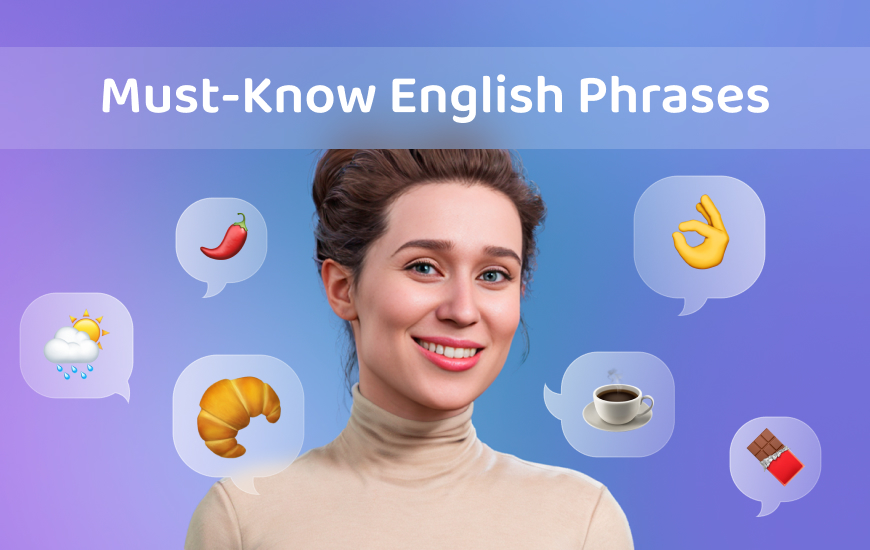Charlie here! Ready to break down some must-know English phrases to help you navigate daily life in Korea? Whether you’re chatting in cafes, shopping for your favorite snacks, or making small talk with friends, these expressions will help you fit right in. Let’s dive in and get you speaking English like a pro in any situation—without the stress!
Ordering Like a Local: English Phrases for Cafes and Restaurants
Common Phrases for Ordering Food and Drinks
Whether you’re grabbing a quick bite or sitting down for a relaxing meal, here are some essential phrases to help you place an order confidently.
- “Can I get [item], please?”
Example: “Can I get a cappuccino, please?” - “I’ll have [item], please.”
Example: “I’ll have the grilled chicken with rice, please.” - “What’s in this dish?”
Example: “What’s in this bibimbap dish?” - “Can I get the bill, please?”
Example: After finishing your meal: “Can I get the bill, please?”
Polite Phrases to Use
It’s always good to add some polite phrases to show respect, especially in Korean culture, where manners are highly valued.
- “Excuse me, can I order now?”
Example: If you’re ready to order: “Excuse me, can I order now?” - “Could you recommend something?”
Example: “Could you recommend something spicy from the menu?” - “Thank you!”
Example: When the waiter brings your food: “Thank you for the meal!”
Dealing with Special Requests
Sometimes you might have specific needs, like wanting your food vegetarian or asking for water. Here are phrases to handle those situations.
- “Could I have [item] without [ingredient]?”
Example: “Could I have the pasta without mushrooms?” - “Could I get a glass of water?”
Example: “Could I get a glass of water, please?”
Ordering in a Café
Imagine you’re in a busy café in New York City, craving a quick coffee. Here’s how you might place your order:
- Customer: “Hi! I’d like a latte with almond milk, please.”
- Barista: “Sure, would you like it hot or iced?”
- Customer: “I’ll have it iced, thank you!”
Try it out with your favorite AI English tutor on Praktika!
Shopping Made Easy: Key Phrases for Markets and Malls
Basic Phrases for Asking About Products
When you’re looking to buy something or need more information, these phrases will come in handy.
- “How much is this?”
Example: “How much is this leather jacket?” - “Do you have this in [size/color]?”
Example: “Do you have this in a medium?” - “Can I try this on?”
Example: “Can I try these shoes on?”
Polite Ways to Ask for Help
If you need assistance, it’s always polite to ask a store assistant. These phrases will help you ask questions confidently.
- “Excuse me, can you help me?”
Example: “Excuse me, can you help me find the electronics section?” - “I’m looking for [item].”
Example: “I’m looking for a gift for my friend.” - “Where can I find [item]?”
Example: “Where can I find the cosmetics aisle?”
Bargaining and Checking Out
If you’re in a market, especially in places like London’s Camden Market or New York’s SoHo, it’s good to know how to ask for a better price or complete your purchase.
- “Is that your best price?”
Example: “This bag is beautiful—Is that your best price?” - “Can I pay by card?”
Example: “Can I pay by card or do you prefer cash?” - “Can I get a discount?”
Example: “Can I get a discount if I buy two of these?”
Socializing and Making Small Talk: English Phrases for New Friends
Breaking the Ice: Starting Conversations with New People
Starting a conversation can sometimes be intimidating, but with a few simple phrases, you’ll be able to dive right in!
- “Hi, my name is [your name]. What’s yours?”
Example: “Hi, my name is Charlie. What’s yours?” - “Where are you from?”
Example: “Where are you from? I’m from Korea.” - “How’s it going?”
Example: “Hey, how’s it going? It’s been a while!”
Asking About Hobbies and Interests
To keep the conversation flowing, ask about their interests or hobbies. It’s a great way to bond over shared passions!
- “What do you like to do in your free time?”
Example: “What do you like to do in your free time?” - “Do you have any favorite books/movies?”
Example: “Do you have any favorite books or movies?” - “What’s your favorite restaurant in town?”
Example: “What’s your favorite restaurant in this area?”
Keeping the Conversation Going
Now that you’ve broken the ice, it’s time to keep the conversation going with some fun follow-up questions!
- “That sounds interesting! Can you tell me more?”
Example: “That sounds really interesting! Can you tell me more about it?” - “What kind of music do you listen to?”
Example: “What kind of music do you listen to? I’m into pop and jazz.” - “I’ve always wanted to try that! How did you get into it?”
Example: “I’ve always wanted to try yoga! How did you get into it?”
Navigating Transportation: English Phrases for Getting Around Korea
Asking for Directions
When you’re lost or trying to find a destination in a city, these phrases will come in handy. Whether you’re in London or Los Angeles, locals will be happy to help you out with the right directions.
- “How do I get to [location]?”
Example: “How do I get to Times Square from here?” - “Can you tell me how to get to [location]?”
Example: “Can you tell me how to get to the Tower of London?” - “Is this the right way to [location]?”
Example: “Is this the right way to Central Park?” - “How far is [location] from here?”
Example: “How far is the airport from here?”
Using Public Transportation
When hopping on the subway or a bus in cities like New York, San Francisco, or Toronto, you’ll want to know some key phrases to help with your journey.
- “Which line do I need to take to [location]?”
Example: “Which line do I need to take to get to Brooklyn?” - “What’s the best way to get to [location]?”
Example: “What’s the best way to get to Buckingham Palace?” - “How much is the fare?”
Example: “How much is the fare to get to the airport?”
Taking a Taxi
In cities like London, New York, or Sydney, taxis are a common and convenient way to get around. These phrases will help you communicate with the driver:
- “Can you take me to [location]?”
Example: “Can you take me to the British Museum?” - “How much will the ride cost?”
Example: “How much will the ride to the airport cost?” - “Can you turn on the meter?”
Example: “Can you turn on the meter, please?”
Must-Know Phrases for Professional Situations
Asking for Clarification
In a professional setting, it’s important to ask for clarification when you don’t understand something. Here are a few phrases to use:
- “Could you clarify that, please?”
Example: “Could you clarify the main point of your presentation?” - “I didn’t quite catch that. Could you repeat it?”
Example: “I didn’t quite catch that. Could you repeat the part about the budget?” - “What exactly do you mean by [term]?”
Example: “What exactly do you mean by ‘project milestones’?”
Agreeing and Disagreeing Politely
Being able to express agreement or disagreement respectfully is key in a professional environment. Here’s how you can do it:
- “I agree with that.”
Example: “I agree with the proposed plan for the project.” - “That’s a good point, but I think [suggestion].”
Example: “That’s a good point, but I think we should focus more on the marketing strategy.” - “I see your point, but I disagree because [reason].”
Example: “I see your point, but I disagree because we need more research on the matter.”
Asking for Opinions and Offering Your Own
When you want to ask for someone’s opinion or give your own, these phrases will be helpful:
- “What do you think about [topic]?”
Example: “What do you think about our new marketing approach?” - “In my opinion, we should [suggestion].”
Example: “In my opinion, we should invest in digital advertising.” - “I’d like to hear your thoughts on this.”
Example: “I’d like to hear your thoughts on our project timeline.”
Wrapping Up a Meeting
When it’s time to conclude a meeting, these phrases will help you end things on a positive note:
- “Let’s recap the key points we discussed today.”
Example: “Let’s recap the key points we discussed today, including the project scope and budget.” - “Thanks for your time. Let’s follow up next week.”
Example: “Thanks for your time. Let’s follow up next week with the action items.” - “We’ll be in touch soon.”
Example: “We’ll be in touch soon to finalize the details.”
Bonus Phrases: Fun and Friendly Phrases to Use with Locals
Giving Compliments
Complimenting someone is always a good way to make a new friend. Here are a few ways to do it:
- “I love your [item]!”
Example: “I love your jacket! Where did you get it from?” - “That was amazing!”
Example: “Your singing was amazing! I’m so glad I saw this performance in London.” - “You have a great sense of style!”
Example: “You have a great sense of style, I’m going to take some fashion tips from you.”
Asking for Recommendations
When traveling abroad, getting local recommendations can be the key to finding hidden gems! Use these phrases when you want to ask for advice:
- “What do you recommend I do around here?”
Example: “What do you recommend I do around here in San Francisco?” - “Where’s the best place to eat nearby?”
Example: “Where’s the best place to eat nearby in Paris? I’m craving something delicious.” - “Is there any local event happening this week?”
Example: “Is there any local event happening this week in Sydney? I’d love to check something out.”
Engaging in Fun, Light Conversations
Lastly, sometimes the best conversations are just for fun. You’ll make friends in no time with these:
- “Have you ever been to [location]?”
Example: “Have you ever been to Australia? I’ve always wanted to see the Great Barrier Reef.” - “I’m new here, any tips?”
Example: “I’m new here in London, any tips for a first-time visitor?” - “I’m loving the vibe of this place!”
Example: “I’m loving the vibe of this café in New York—perfect spot for a chat!”
Remember, learning is a journey, and with a little practice, you’ll soon be speaking English fluently in no time! Ready to take the next step? Download Praktika now and start practicing your English conversation skills with your AI English tutor. Let’s get you confidently speaking English every day—no matter where you are!

From Charlie
Charlie is your go-to guide for mastering English with a creative flair. With a background as an editor-in-chief and a passion for art, languages, and culture, Charlie brings a fun, engaging approach to learning. Whether it’s enhancing your business English, perfecting your presentation skills, or just chatting about your favorite books and movies, Charlie’s here to help you navigate the world of English with confidence.
